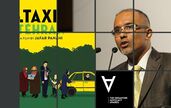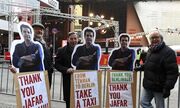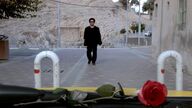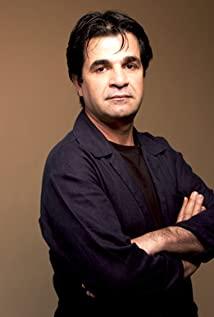- This film is a pseudo-documentary (docudrama), in the form of a documentary, with the real identity of the director, the filming is realistic and real, expressing the theme.
- The shooting technique is very proficient, using techniques as much as possible to present the reality, while at the same time using full drama, using the environment under natural light, the performance and perspective of the actors to manage, and strengthen the narrative rhythm and artistic space. The narrative efficiency of the whole movie is high, and it is not cold.
- Through 10 groups of passengers and 10 paragraphs, the film covers the four major themes of reality, film, morality/law, and ordinary people. Through natural and credible dialogue, it explores sharp topics in a gentle tone. The physical structure is small, but the social structure is large. The setting of the characters is very representative, reflecting the director's strong social observation ability. At the same time, the appearance sequence, discussion topics, and dialogue ideas of the characters are true and credible, and the structure is clear.
- The metaphors and emotions of the film are built within the credible range, and they are not obsessed with the definition of pseudo-documentary or drama, and even deliberately blur this definition, so that the audience can feel the existence of creative traces.
- A password setting that moisturizes things silently in the opening → the roulette-style dialogue of the positive film → the seemingly gentle ending leaves a point of resistance to the end, which is worthy of careful consideration.
- The film actually incorporates the three most representative types of Iranian films: Abbas’ car films, children’s perspective films that opened international attention in the 1990s and 00s, and intellectual reflection films after 2000.
Structure and thematic analysis
- The film has four major themes: reality, film, morality/law, ordinary people
- Reality:
- Injured man and wife: Because of the inheritance law, a man who is worried that his wife will have nothing to leave a video will after his death. His wife has repeatedly confirmed whether she can send her a video will. A traditional Iranian woman who has no sense of security.
- Scavengers: a kind-hearted little boy from a single-parent family. He picked up the money and repaid the money for the girl’s suggestion, but failed.
- Movie:
- Pirate dealer: I think he is also engaged in cultural activities. The director didn’t point out and criticized him, and used some gentle attitude to stop there.
- Film Youth: On behalf of some film beginners, the director gave his own suggestions. Watching other people's films and novels are the finished products of other people's expressions. You have to find your own expressions.
- Little niece: Film homework from the perspective of the child/teacher, similes and complaints about the film industry and regulation
- Ethics/Legal:
- The teacher’s perspective in the opening session: Very rational, attaching importance to rights, freedom and interest, being condescending in the face of ordinary people, representing the spirit of rationality and modern civilization
- Injured man and wife: Because of the inheritance law, a man who is worried that his wife will have nothing to leave a video will after his death. His wife has repeatedly confirmed whether she can send her a video will. A traditional Iranian woman who has no sense of security.
- Lawyer: Emphasizes freedom, believes optimistically, breaks boundaries, and presents flowers to the audience, the whole film's humanity is glorious (but the political inclinations are somewhat straightforward)
- Ordinary people:
- The young and Dangerous boy at the opening: It is necessary to draw a clear line between the little hairy thief and his own thief. It represents a person who lacks rationality but only considers emotions and self-identity, and also represents tribal civilization (the text mentioned the classics Text), there is a spirit of revenge
- Old sister x2: Some ordinary people who are superstitious, mean, insecure, and have lost their wallets, represent the image of the most people who are kidnapped by faith
- Old neighbor: Rich people who were robbed and beaten, but sympathized with people they knew and decided not to call the police. But in order to resolve worries, we have to talk to the director to resolve
- Side A of the film: the little niece and the director: the observers and witnesses of the whole movie, the director’s heart, words and actions, invisibly have an impact on the little niece, and also clearly express the director ’s idea to the audience .
- Through the little niece’s discussion of film homework, good people and bad people, the director and little niece used dialogues to speculate
- Through the director’s interpretation of "reality", the young niece planted the seeds of "reality" or "movie" in her mind
- Through the shooting of juvenile scavengers, the little niece understands that good people, bad people, and real people are not general concepts.
- Through a beautiful lawyer, my little niece understands the beauty of freedom
- By returning the wallet, the little niece can experience the basics of goodwill
- Side B of the film: At the same time, the film clearly distinguishes the tone of the story where the little niece is not present. In places where the little niece did not see, adult malice and goodwill occur. The director does not have perfect answers, but just asks these questions for everyone to think.
- Young and Dangerous Boys and Teachers: Rationality and irrationality are behind the conflict between modern civilization and tribal civilization in Iran
- Pirates and film youths: The erosion of local film culture by overseas piracy has left local creators confused. Some local films are allowed to be pirated, which is equivalent to becoming partners in piracy.
- Patriarchy and feminism: Giving under the patriarchal system and women's uncertainty about their own interests
- The rich and the poor: the goodwill of the rich and the hardship of the poor, mutual understanding may bring hope
- Reality:
- The beginning and end of the film
- Opening: Starting from the red light, you have to wait patiently until the green light to move forward, a metaphor for the director's experience of being banned from filming. Combined with the film's cramped space, a big theme of "we live under the rules of society" was brought out.
- Ending: Against the background of the flower of freedom, the camera in the taxi was taken away, but they did not find the memory card in the end—you can take away my creative tools, but you can’t take away people’s memories and the pictures I took.
Behind the scenes
Source: https://www.imdb.com/title/tt4359416/trivia/?ref_=tt_ql_trv
- The film was originally intended to be made into a pure documentary with the director's mobile phone, but during the rough shooting, a passenger believed that privacy was infringed and requested to shut down. The director then decided to make this film a pseudo-documentary to prevent passengers from falling into danger.
- After the film premiered in Berlin, the director issued a statement expressing his determination to continue to create publicly.
- The film uses three small Blackmagic pocket cameras to prevent being noticed by outside vehicles and to protect the safety of the actors. Only natural light was used to shoot, and the director opened the skylight to ensure sufficient light.
- The passengers are all non-professional actors and anonymous (to protect their safety) except for the little niece in the film
- Due to legal restrictions, the director could not go abroad to participate in the film festival. The director’s niece (that is, the little niece in the film) accepted the award on his behalf in Berlin. The little niece shed tears on the spot. Finally, the golden bear took a photo with a blank background.
- The structure of the film is a tribute to the director’s mentor, Abbas’s "Ten Rhythms of Life". Abbas’s "10" has 10 passengers. This film has 10 paragraphs and 10 passengers (I counted it myself). Bath’s other masterpiece "The Taste of Cherry" is also a movie with a similar structure. It takes the driver as the perspective and advances the story through the interaction between the driver and the passenger.
- After the film was awarded, the director implored the government to allow his film to be shown in an interview. The film authority of the Iranian government immediately issued a statement congratulating the film on the award, allowing the director to release the film, and accusing the Berlin Film Festival of political factors and spreading misunderstandings.
- After winning the Golden Bear Award, Jafar became the first director in Iran’s history to win the three major film festivals (Golden Bear, Golden Lion, Golden Leopard). This film is also the second film to win the Golden Bear Award after "A Farewell" Iranian film.
- The film does not have an official credits and credits staff list, only the title of the film and a statement appear at the end.
notes
- Opening
- The main perspective of the empty shot at the opening shows a complete red light waiting, music intervenes, then the green light turns on, the picture moves, and the first passenger is received
- The passenger cannot be seen in the angle of view, until the passenger pulls the camera over and the feature film begins
- Paragraph 1: The justice of anti-theft
- The male passenger began to discuss the role of the camera in response to the camera, and then the female passenger of Pinke began to intervene in the discussion-the two people started a discussion on the "justice of anti-theft."
- Man: Severe punishment is required to prevent theft-"There are provisions in the law and Islamic law"
- Woman: Investigate the root cause of the crime-"The law cannot solve all problems" "The number of people sentenced to death is equal to that of China"
- Woman: "What is your job?" "You defend an idea, if you don't believe it, it will be beneficial to you"-a woman's profession is a teacher
- Man: My job is to rob, but I don’t rob teachers or drivers like you. People who steal tires from poor people are the most despicable.
- Cohesion: familiar strangers
- Meet the director’s video shopkeeper-pirated DVD
- Before, he kept receiving calls urging him to be there soon
- Paragraph 2: Car accident
- The man suffered a car accident and kept asking for a will to leave enough property for his wife, otherwise he would be homeless under the inheritance law
- The video shopkeeper recorded a video of the injured person’s will with his mobile phone. There was a tunnel in the middle. After the dark tunnel, the injured person passed out (?)
- The woman turned around and asked for money for the car, but the director refused
- The woman ran out again and asked for a movie of the will, and the director gave him a business card and asked him to contact him again
- The video store owner used the director’s phone to record the whole process
- The woman called again to confirm the phone number
- The video store owner’s cell phone is out of power, so he picked up the director’s cell phone and called other customers
- Paragraph 3: Film youth + answer the phone x2 (high narrative efficiency)
- The camera is aimed at the image shop owner, observes him in a big house, and asks someone out
- The voice was that the director received a call from the woman again. Her husband seemed to be alive, but she wanted to save the will for later use. The director agreed, but asked herself to make a backup copy.
- The video shopkeeper arranged the customer to the car and watched a large package of pirated discs-it seemed that it was not because there was no money to buy the original, but the money could not be bought.
- The director received a call again, it was from a customer of the video store
- Borrowing the car to the mouth of the customer, the director knew that the video store owner described himself as a partner
- The customer discusses the movie with the director. The customer reads movies and wants to be a director. He has watched a lot of novels and movies, but he still doesn’t know how to choose the topic of his work.
- Director: Those movies have been made, and those novels have been made. The inspiration will not come out by yourself. You need to find it yourself. Everything is difficult at the beginning. No one can tell you how to find it.
- Connection: get off the shop owner
- We can make a lot of money in piracy. You and your son are both. Without me, you wouldn't see Woody Allen. The director asked the owner to get out of the car and let him keep "investing in his own cultural activities". The owner came up and said that he hoped to partner with him and was sincere.
- Paragraph 4: Old Sisters (the pure backseat photographic perspective began to appear here, but maybe ordinary stock audiences don't care too much)
- The old sister wants to arrive at Aliquan at 12 o'clock and put the fish in
- The fish tank in the middle was broken, and the director found a plastic bag to fill it with water and rescued the fish
- The old sister re-told the story: these goldfish came from Aliquan, and the two were born at noon five years old, so they had to put the fish back at noon and exchange for two new fish, otherwise they would die
- The director said that he was going to pick up his niece from school and get off the car to help the old sister re-appoint a car
Note: Here we can actually notice that the blood stains on the seat have disappeared, and the director has no intention to continue the rationality of the plot
- Paragraph 5: Talking niece
- The little girl lay on the car window, there was a confusing brewing, and at the same time let us see that the school was closed and she was the only one at the door
- Little girl: 1. Why did you drive a taxi, I boasted that my uncle director is coming; 2. Why did you not be punctual, I waited for an hour and you just looked at me and didn’t speak; 3. If I was caught Why did you explain the kidnapping to my parents——Director: I don’t worry at all, no one can stand your broken thoughts
- The director said he was going to meet his neighbor
- The little niece took out the camera to film the director, saying that it was a job she left, but she kept talking with the director about what she was interested in. She didn’t care what the movie was going to do.
- Homework: The Iranian and the Afghan failed to fall in love, and the Afghan boy was beaten up by the Iranian at his girlfriend's house—and these are things the little girl has photographed
- Director: Since you have all filmed, why bother to look for a story — Little niece: Damn it if this thing can be shown publicly, you are still the director at a loss
- Director: Do you want to show it in public?-Little niece: Of course, the award-winning film can also get a bonus, which can be used to make a better film for public screening.
- Paragraph 6: My old neighbor is very rich
- The director got off the car, and the next scene happened to be filmed by the little niece
- The director just said hello, hugged, said a few words, and left
- "His father is a good friend of your grandfather, he is our former neighbor"
- The friend walked to the car, chatted with the little niece, and bought Frappuccino for the little niece
- My friend brought in an iPad to show the director. The director kept watching and the audience was curious.
- Little niece: Your friend is suspicious. Ask me to put the camera in the car. He might want to kidnap me—and then Mei Dian Dian went to find a friend.
- Interlude: A pirated brother selling CDs
- My friend came back by himself
- It looks like the picture on the monitor, the friend was beaten, it looks like it was robbed by a couple
- The friend saw the criminals and didn’t call the police-the news reported the hanged criminals, and he couldn't bear to call the police-more importantly, he knew them, he knew they were in financial difficulties, and saw them use the stolen money to solve the problem
- My friend wants to talk to the director to solve my pain
- The waiter delivered the drink to the car, and the friend said, "This is the thief"
- Director: I want to see what he looks like; Friend: like you and me, like everyone around
- Director: Are you getting better; Friend: Much better
- Two people discussed: I don’t know here anymore, many places have been razed to the ground, everything has changed
- The two thanked each other and said goodbye to each other
- The little niece came back, and the director asked what the person looked like again. The little niece: Same as everyone else (reminiscent of "Memories of Murder")
- Paragraph 7: The little niece’s film requirements
- The teacher puts a lot of rules on the short film to be shot
- Respect the hijab of Islamic women
- No close contact between men and women
- Avoid the filthy reality
- Avoid violence
- Avoid good guys and tie a tie
- Avoid using Iranian names for good people and use the sacred names of Islamic saints
- Director: I was thinking about the neighbor we talked about just now, how can we help him, is he a good person or a bad person, he wears a tie, he has an Iranian name
- Little niece: What you are talking about is reality, these rules apply to movies
- Director: What if he is a good person in the movie
- Little niece: Then transform him from head to toe
- The little niece continued to talk about the rules, and said that the teacher said that we should judge for ourselves, what we can and can’t be filmed, we should know best-this is very typical of the master's own way. It can be imagined that the film bureau will also treat Chinese directors who cannot pass the trial. Will express it like this-of course, the plot will be clearly connected later
- The teacher puts a lot of rules on the short film to be shot
- Paragraph 8: Good people in movies and reality
- The director got off the car again, it should be to go to the bathroom, this part was filmed by the little niece again
- My little niece filmed a wedding video of the newlyweds
- The bridegroom’s money fell on the ground, followed by a scavenger child. The child stomped on the money with his feet and picked it up casually, then went to the trash can to pick up the bottle. The little niece photographed the whole process and called him over.
- The two discussed:
- Little niece: The teacher asked me to hand in my homework next week. Your act of picking up money prevented my movie from being released. Go and return it to the groom quickly. I will give you five yuan as compensation.
- Little boy: Five yuan for fifty yuan, am I sick? They are very rich at first glance, spend so much money on makeup, and don’t care about these fifty
- Little niece: They don’t care about me. I only care about my movie. Please return the money to him. Don’t ruin my movie. If you pay back, I will let you be the protagonist of my movie. I want to prove sacrifice and selflessness. Please
- Little boy: What is sacrifice and selflessness? I don’t want to be the protagonist. I just want to give the money to my dad. I don’t have a mother.
- The little boy couldn't stand the girl's plea and decided to pay the money back. The first time, he just put the money on the ground, and the second time, he picked it up and sent it back to the groom. The bridegroom only took care of himself to make a video.
- Director back: What are you angry about, nothing
- The director drove the car away, and the little niece finally picked up the camera and took a picture of the little boy scavenging waste.
- The noisy she fell into silence, but her heart was no longer calm, the film entered a silence that lasted for a few minutes
- Paragraph 9: Lady giving flowers
- The director got off the car again, saying that as if he had heard something (the person who interrogated himself), the little niece took out the camera again
- After receiving the flower delivery lady, the two exchanged greetings. They are lawyers. When it comes to people who questioned themselves, we know that the director was questioned with a face covered.
- The director asked the lady where she was going, and the lady said she was going to Paradise-Paradise Street-Fannock (near the prison)
- A lady was arrested while watching volleyball. She has been on a hunger strike for 108 days and has been on a hunger strike for 5 days-you and I have all gone on hunger strikes, but this is a last resort
- Lawyer's license is about to be revoked
- A wallet was found in the back seat-the old lady's wallet-two ladies from Aliquan
- The lawyer got off the car and presented flowers to the audience before getting off the car and greeted the audience
- Emphasize the point of view: political drama + moral kidnapping → make the outside world a bigger prison
- Little niece: What exactly is a "filthy reality", the director discussed with the little niece-a bit straightforward
- Epilogue: Ali Spring
- The director and his little niece came to Aliquan to return their wallets, and the flowers were placed horizontally below the camera
- The thief smashed the car window, got in the car and took down the camera-without a memory card, come pick it up next time
- At the end, it is stated that the Iranian government has allowed the film to be shown, and there is no thank you list (in order to protect the majority of people who participated in the film)
View more about Taxi reviews







